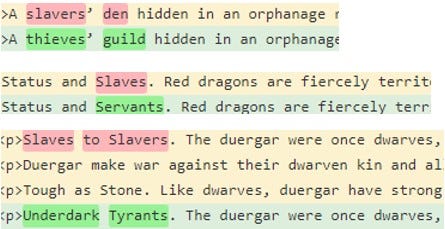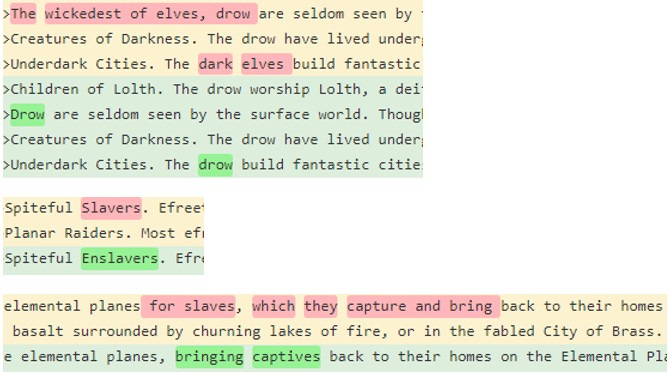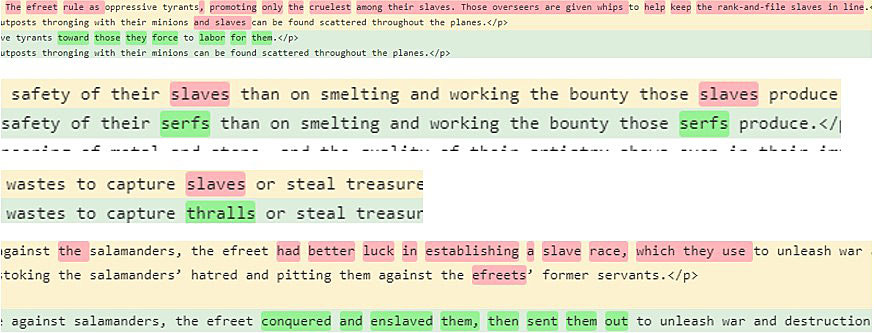d20 Combat Liberalism
Tracking WotC’s Core Book Sensitivity and Inclusivity Changes (And Why They Don't Matter)
This blogpost is largely a response to this blogpost, although it coincides with thoughts I’ve been having and research I’ve been doing in relation to the history of European Early Middle Ages slavery and how to and whether or not to explicitly include it in a TTRPG.
…But liberalism rejects ideological struggle and stands for unprincipled peace, thus giving rise to a decadent, Philistine attitude and bringing about political degeneration in certain units and individuals in the Party and the revolutionary organizations.
- Mao Zedong, “Combat Liberalism” September 7, 1937
People (specifically Westerners*, however you might define that) are not taught correctly or effectively about the practice of human chattel slavery, and that leads people unable to correctly or effectively talk about chattel slavery, and that leads to an inability to correctly effectively teach the history and far-reaching effects of human chattel slavery, and in addition to perpetuating this cycle it leads to a social taboo of even invoking the word - slavery - in any regard, even when it is very applicable and should be spoken. New words are found to convey the condition and legal institution of slavery that do not use the word “slave,” “slavery,” “enslaved.” In this manner, with education and foreknowledge removed or neutered, it is the word “slavery” that becomes the issue, and not the condition of the enslaved. This is a profoundly damaging and insidiously spread social contagion that seems trivial to speak about in the sphere of tabletop role-play, but: a) art and culture are a mirror to society, and a flawed mirror produces flawed art; and b) this is a tabletop role-playing game blog and that’s what I do and talk about, so here we are.
I reject the notion that the word “slave” or “slavery” cannot or should not be used in a tabletop role-playing game book, as well as the idea that role-playing game books or games cannot and should not contain or discuss the concept of human chattel slavery. This was, admittedly, not always the case, and like most things my feelings are largely complicated. I do maintain that, like other important social constructs - race, gender, class - discussion should be done honestly, openly, from a position of foreknowledge and education, and with some* care taken to ensure the mental and emotional safety of those participants (note the disclaimer “some” and that I do not use the word “comfortability”, more on this later). I think - though I am undecided - that it might be better not to include slavery as a topic at all than to do it poorly or insensitively or for shock value. But ultimately I think ignoring the fact that the legal institution of chattel slavery has existed in “organized” human societies longer than it hasn’t and how that has shaped those societies does a profound harm to us personally and our understanding of societies and each other.
A current project is a setting guide for European Early Middle Ages role-play, specifically 10th century Francia and surrounds. This has involved a significant amount of research into 10th century European history, language and culture, and while the book itself - Saeculum Obscurum, shameless plug, look for it soonish - takes a great deal of liberties for the purposes of fantastical fiction, it does nonetheless have a somewhat solid foundation with regards to historical cultures. I’ve always found historical role-play extremely compelling and have been disappointed, to say the least, in what passes for historical role-playing game books, which like many corners of the tabletop role-playing games industry are unfortunately a haunt of aggressively far-right bigots disseminating ahistorical propaganda. One has to look no further than Lion & Dragon, a book to my knowledge nobody has ever fully read let alone played, or the many historical-adjacent LOTFP books, to see historical settings and context weaponized to confirm the author’s own bigotries. Naturally, these “historically authentic” books cite zero sources.
A sort of “gut check” for me while writing Saeculum Obscurum has been how prevalent depictions of chattel slavery are. For those of you unknowing (which, given several conversations I’ve had, might be a lot), chattel slavery in the Early Middle Ages was a truly massive institution spanning every cultural group across Europe, North Africa and the Levant (and beyond, naturally, but I’m specifically looking at these areas). Many I am sure are aware of the oft-alluded to Islamic slave trade due to how frequently it is invoked to smokescreen discussions on the evils of the Middle Passage slave trade. And to be sure, the Caliphates trafficked in a lot of enslaved people throughout North Africa, the Levant, and Al-Andalus. What’s interesting is how little white Christian (and paegan!) European slavery is mentioned, if at all. Under Danelaw, I’ve seen estimates suggesting upwards of one in ten people in the British Isles were enslaved. Venice was a slave state. Southern Italy trafficked a great many slaves across the Mediterranean, mostly to Muslims. Kievan Rus shipped caravas of enslaved people through Eastern Europe. Slavery thrived in Christian Iberia; both conquered or captured Galicians and Muslims. The same form of slavery that was practiced in the Western Roman Empire was enshrined in law in the Eastern Roman Empire and throughout Europe. There were enslaved people in Francia, in Armorica, in the Carpathian Basin, in Lombardy, in the Papal States.
At the same time as all of this medieval slavery, there was developing - and in many ways evolving - the system of feudal serfdom. There are obviously as many differences as similariries between serfdom and chattel slavery. These two institutions also existed independant and alongside one another across Europe. There is, therefore, not a neat and tidy binary evolution or indeed distinction between 10th century chattel slavery and feudal serfrom, and to try and establish it as such does a disservice to the many shades of oppressive servitude. Ultimately both systems exist to restrict or remove sovereignty, particularly in the judicial sphere; enforce legal distinctions between economic and social classes, and permit state sanctioned violence (Foucault's droit de glaive) against a specified polity. There may not be clear causality but there is undeniable correlation between the development of feudal serfdom and the institution of chattel slavery.
All that to say this: it becomes difficult to justify including feudal serfdom, a tangible byproduct of chattel slavery, without even mentioning chattel slavery itself, and that is true both in settings explicitly based on historical context and those that lean more heavily into the fantastical. The way that feudal serfdom and chattel slavery blend together is present in both the historical and fantastical realms whether or not the author or storyteller is aware of this. “But Noora,” you might ask, “in an imaginary world, why can’t you just imagine a world that doesn’t have slavery?” Remember when I said art was holding a mirror up to society? Your imaginary world’s rules and societies are influenced by your understanding of the real world’s rules and societies. Your understanding of and ability to convey narratives - such as conflict, oppression for example - is informed by your understanding of conflict (for example, oppression!) in this world. Imaginary worlds are not written in a vaccum! Speculative fiction writers’ works are informed by their imaginations yes, but also their experiences, their existing information (or lack thereof) on topics, existing biases - all of the things that make a person a person are reflective in their art whether or not they are conscious of it.
Or put more succinctly: your fictional world doesn’t use the word “slave,” but it does include the concept of slavery.
For some rather clear-cut examples of this, see the above blogpost, which is a meticulous look at various linguistic changes Wizards of the Coast has made to Dungeons & Dragons books over the years. These changes, which are made under the guise of inclusivity and sensitivity, remove the offending language (such as use of the word “slave”) while removing none of the offending context (such as the condition by which a sentient being would be under the legal possession of another).
From the DMG:
In this first example, we see “slaves” being downgraded to “servants” with nothing else being changed in the sentence. Servitude could of course be voluntary and/or compensated, but I get the feeling it is not. This is likely more in line with that feudal serfhood I mentioned above, which while not explicitly slavery is not quite so different enough to really be “better".” Ditto for the third example, where “slave pens” is hilariously altered to “quarters for enslaved creatures,” where we see the efreet still very much keep slaves, but rather than “pens” they’ve graciously been granted quarters. How generous!
From the Monster Manual:
Here again we see “slaves” upgraded to “servants” without the contextual inclusion of whether or not those servants are voluntary or compensated. Given the way that monsters are depicted in D&D lore, I am willing to bet you don’t punch in and out of servitude when you are employed by a red dragon, nor do you get weekends off. More feudal serfhood, then. In the same way, changing “slavers” to “tyrants” is rather specific on one’s understanding of tyranny. Is the context here really an improvement? Or have we merely identified the problem is the word “slave?”
These passages are with regards to illithid and drow, both explicitly depicted as slave states through much of their existance within D&D lore. In both cases the word itself, “slave,” has simply been replaced by “captive” or “laborer.” I am sure the victims of underground brain-cannibals feel much more at ease being regarded as “captives” and not chattel. What a very meaningful and not at all trivial distinction!
I don’t really need more examples to hammer this point home (although changing “slavers” to “enslavers” is very funny to me) however I want to point out two rather damning further examples where “slave” has been replaced by “serf” - once again, connecting chattel slavery to feudal serfhood - but also where “slave” has been replaced by “thrall.” “Thrall” is, incidentally, what enslaved people were called under Danelaw. It still specifically refers to slavery. So, again: the sensitivity consultants at Wizards have identified the word “slave” as the issue, not the context under which sentient beings are enslaved. This is heralded as progress.
…To regard oneself as having rendered great service to the revolution, to pride oneself on being a veteran, to disdain minor assignments while being quite unequal to major tasks, to be slipshod in work and slack in study.
- Mao Zedong, “Combat Liberalism” September 7, 1937
Inclusion of slavery is (and should be!) a contentious topic at the gaming table. It is my personal belief that more conversations, not less, need to be held around the evils of chattel slavery - particuarly the Middle Passage period of the trans-Atlantic chattel slave trade - where the institution of slavery is firmly established as a legal and systemic institution and not merely a (usually highly racialized) narrative device to establish an individual or small group as barbaric, evil, and/or uncivilized. The fact of the matter is that modern European society (and by extension modern North American society) is built atop a legacy of settler colonialism and foundational chattel slavery, the effects and impact of which resonates to the present day. That legacy and those foundations were, at the time, entirely legal. And while there have been abolitionists as long as there have been slaveowners, it was slavery and not abolition that was enshrined and protected under law. Abolitionists are overwhelmingly cast as villains during their lifetimes, their deeds only recognized as heroic posthumously.
How frequently have you heard GMs and/or specfic authors say “I include slavery as a narrative in my [games/fiction/etc] because it allows for player empowerment to defeat the evil slavers and free the slaves enslaved thralls captives”? How often are “slavers” as a faction either criminals or a measure of a particular group/nation/culture’s irredeemable evil and barbarism? How frequently is that a specifically (or even unintentionally) racialized group? The evil of slavery is, in specfic, consigned to the most moustache-twirling, tooth-gnashing villains. It is a cultural aberration, an extrajudicial cruelty, a dividing line between civilized and uncivilized, hero and monster, Light and Dark.
This, of course, relates back to the miseducation of the history of slavery as a byproduct of personal moral failing or, at best, the decision of a corrupt administration or series of administrations. A lapse in judgement that was swiftly corrected. Americans love to brag about who is responsible for “freeing the slaves,” (certainly not them) and to listen to the British academic class, the British Empire instituded chattel slavery for the specific purpose of immediately abolishing it within the Empire and also abroad (when in reality they did neither of these things). This glossing over of chattel slavery as a widely practiced legal institution serves a very specific purpose, and that is to re-frame Western society as one of the victims of the chattel slave trade, an unwilling participant in a moral evil that must be acknowledged and apologized for in much the same way one makes a land acknowledgement: with zero introspection on how one has benefited from the practice being acknowleged, zero significant action taken to adjust or correct those benefits towards those who have actually suffered, and a great deal of back-patting and liberal white guilt assuagement.
A piece of media that represents chattel slavery strictly in terms of a moral practice and not a legally protected one is not addressing the subject matter honestly, accurately, or responsibly. On the other side of the coin, removing all instances of the word “slavery” from a piece of media that includes representation of other forms of coercive oppression such as involuntary servitude, feudal serfdom or incarceration - particularly incarceration as we, modern humans, would understand it, where laws exist to protect the financial interests of a ruling class and are enforced by paid agents of state violence - is still very much including slavery or slavery-adjacency! Just because a different term is being used for it doesn’t eliminate the context under which that term is being used! Of the two harmful inaccuracies, I honestly could not tell you which is worse. I suppose I think that while it is historically irresponsible to simply pretend slavery never existed; but it would be far better to pretend thus than it is to represent the horrors of slavery glibly, irresponsibly, or for shock value. But like chattel slavery and feudal serfdom, the difference between those two positions is not so great that they should be celebrated.
As a descendant of enslaved Africans, I believe in presenting an honest and unflinching examination of the evils of chattel slavery as a horrifying reality participated in and profited from by Europeans for much of human history and not as an oversimplified narrative device or as a short and unfortunate period in an otherwise moralistic Western society. This is and should be an ungoing, honest and above all difficult conversation at your table. And while participant safety should be prioritized in these conversations, comfortability should not necessarily be. It is uncomfortable to talk about human chattel slavery. It should be uncomfortable! It should specifically be uncomfortable for those who have historically benefited from human chattel slavery. European medieval slavery built European empires, which in turn expanded into colonial empires, which outsourced that chattel slavery across the globe with new justifications and into an unending racialized hereditary form of slavery.
That being said, I am one Black person. Other Black people (and other racialized people who have historically been the victims of institutional racialized chattel slavery) may feel differently. I can and do respect “I just don’t do slavery narratives” from Black North Americans; I don’t personally have the same patience for white people. The foundation of white North American (and European, to keep it a buck) society, the reason you are where you are reading this blog and playing tabletop role-playing games, is built atop a legacy of slavery, specifically West African slavery. Frankly, my ancestors built your house; you can stand to be a little uncomfortable discussing the conditions it was made under.
…To see someone harming the interests of the masses and yet not feel indignant, or dissuade or stop him or reason with him, but to allow him to continue. This is an eighth type.
…To work half-heartedly without a definite plan or direction; to work perfunctorily and muddle along--"So long as one remains a monk, one goes on tolling the bell." This is a ninth type.
- Mao Zedong, “Combat Liberalism” September 7, 1937
Ultimately, if your group does not want to include chattel slavery as a theme in your game nights, that is your right. If you as a player or GM do not feel properly informed or equipped to handle chattel slavery as a theme in your game nights, that is your right also. But it is worth personally and communally examining those whys.









This is incredible. Thanks for sharing it, I'll be thinking about this a lot.
I love the gaslighting of legitimate concerns about language use in our games! I especially liked how you singled out white Europe for slavery when it has been an institution practiced by every other society long before and alongside European ones.